CAPE COD BRUSH BREAKERS
"A pictorial history of the unique forest firefighting apparatus"
By Britton Crosby
First Posted January 2001 - Re-released March 2014
(Updated March 2014)
_________________________________________________________________
![]() A Special Feature
A Special Feature ![]()
CAPE
COD BRUSH BREAKERS
![]()
"A pictorial history of the unique
forest firefighting apparatus"
By Britton Crosby
First Posted January 2001 - Re-released March 2014
(Updated March 2014)
_________________________________________________________________
< PREVIOUS |
BRUSH BREAKER INDEX PAGE | NEXT >
_________________________________________________________________
Page 1
The Story Cape Cod Brush Breakers
![]()
| On this page |
| On this page |
Breakers
| 01 - Index Page / The Story of Brush Breakers The Story of Brush Breakers Feature Page Index Apparatus Featured Index Highlights of Fires & Apparatus in History Examples of Breakers, Forestry, Tankers, etc Update History 02 - Cape Cod Forest Fires History Forest fires in SE Mass Historical Fires Cape & Plymouth 1780 1887 1900 1907 1923 1937 1938 Sandwich Fatal Sandwich FF Memorial 1938 Fire 1957 1964 1971 1995 Smokey Bear campaign 03 - Fire Towers & Patrol Planes Spotting smoke and finding fires Fire Towers Cape Cod Patrol Trucks Communities County State Patrol Planes Barnstable County Plymouth County 04 - Before Brush Breakers Firefighting by Hand Filling Extinguishers 1920s-1930s Fire Trucks 1920s State truck 1930s Edgartown FF Truck 1930s Plym FF trucks 1930s Yarm trucks Early Patrol Trucks 1930s-1940s 05 - The First Brush Breaker - 1937 1937 Ford TOB Osterville 06 - Barnstable County Brush Breakers - 1939-1950s First Generation 1939 No1, 1941 No2, 1949 No3, 1951 No4 07 - Early State Forest Fire Apparatus - 1930s State Patrol Truck 1938 Ford COEs 1939 Brush Breaker 25 08 - Cape Cod Brush Breakers - 1930s-1940s 1938 Sandwich Ford 1940s Camp Edwards green 1942 COFD E4 1940s Dennis patrol 1944 Otis Diamond T 1940s Bourne 1946 Fal Dodge C30 1947 Bourne 7 1947 TOB Cotuit 1947 TOB Cent 1949 Bourne 9 1949 Bourne 8 09 - Plymouth County Brush Trucks - 1930s-1940s Wareham Plymouth 10 - Forest Fires 1930s, 1940s 1930s Dennis Fire 1946 Cape Fire - Images from the video 1950s-1960s 11 - Second Generation Brush Breaker - 1952 Second Generation 1952 Ford TOB Osterville Breaker 12 - Second Generation Barnstable County Breakers - 1950s-1960s Second Generation 1957 Maxim No1 C15 1958 Maxim No2 C14 1960 Maxim No4 C12 1963 Maxim No3 C13 13 - State Brush Breakers - 1950s-1960s 1964 FWD Breakers 1968 Int/Farrar patrol trucks 14 - Cape Cod Brush Breakers & Tankers - 1950s-1960s Brush Breakers and tankers 1950 Ford Mash E1 former 1930 COFD E3 1950 Dodge Mash E2 1950 Harwich Ford white elephant 1950 TOB Ford patrol 1951 Bourne Patrol 2 1954 Ford Chilmark 1955 Dodge Fal C33 1957 Mashpee 253 1957 Inter Har E2 1957 Dodge Yar E6 1957 Inter Plym patrol - Great Island 1950s GMC Dennis patrol 1950s Dodge Manomet 1950s Ford Halifax 1950s Carver 24 1950s Dodge Marion E4 1962 Int/Maxim TOB 212 1965 Fal Tanker 1965 Sandwich 1967 Mashpee 1968 Otis 15 - Plymouth County Brush Trucks & Tankers - 1950s-1960s 1950s 1962 Onset PW 1964 Lakeville 1964 Marion 1960s Duxbury 1965 Wareham 1967 Middleboro Jeep 1967 Carver 1968 Wareham,/Rochester 16 - Forest Fires 1950s-1960s 1964 Carver 1965 Otis-Sandwich Forest Fire 1970s-1980s 17 - Third Generation Brush Breaker - 1967 1967 Maxim TOB Ost 216 1969 Dodge TOB Cotuit 217 18 - Second Generation Barnstable County Breakers - 1970s-1980s 1971 No1 Fal C15 1982 WB B295 19 - State Breakers - 1970s-1980s Breakers Tankers 20 - Cape Cod Breakers and Apparatus 1970s-1980s Breakers Forestry Tankers 1970 Wellfleet 90 1971 Dennis 110 1972 Otis B9 1973 Hya 84 1973 Sand 153 1973WB T296 1975 Bourne 128 1977 Bourne 130 1976 Fal B20 1976 Chilmark 1976 Dennis F105 1970s Barn B204 1970s Otis T13 21 - Plymouth County Breakers 1970s-1980s Plymouth Wareham Carver 22 - Forest Fires - 1970s-1980s Otis Fires 1990s-2000s |
| Page 1 - The Story of Brush Breakers / Apparatus Index Page |
| Page 2 - Cape Cod Forest Fires History |
| 1910s-1920s |
| Page 3 - Fire Towers, Patrol Trucks, Patrol Planes |
| Page 4 - Before Brush Breakers |
| 1930s-1940s |
| Page 5 - The First Brush Breaker - 1937 |
| Page 6 - Barnstable County Forest Fire Apparatus 1st Generation 1930s-1940s |
| Page 7 - State Forest Fire Apparatus 1930s-1940s |
| Page 8 - Cape Cod Brush Breakers 1930s-1940s |
| Page 9 - Plymouth County Forest Fire Apparatus 1930s-1940s |
| Page 10 - Forest Fires 1930s-1940s |
| 1950s-1960s |
| Page 11 - Second Generation Brush Breaker - 1952 |
| Page 12 - Barnstable County Forest Fire Apparatus 2nd Generation 1950s-1960s |
| Page 13 - State Forest Fire Apparatus 1950s-1960s |
| Page 14 - Cape Cod Forest Fire Apparatus 1950s-1960s |
| Page 15 - Plymouth County Forest Fire Apparatus 1950s-1960s |
| Page 16 - Forest Fires 1950s-1960s |
| 1970s-1980s |
| Page 17 - Third Generation Brush Breaker - 1967 |
| Page 18 - Barnstable County Forest Fire Apparatus 1970s-1980s |
| Page 19 - State Forest Fire Apparatus 1970s-1980s |
| Page 20 - Cape Cod Forest Fire Apparatus 1970s |
| Page 21 - Cape Cod Forest Fire Apparatus 1980s |
| Page 22 - Plymouth County Forest Fire Apparatus 1970s |
| Page 23 - Plymouth County Forest Fire Apparatus 1980s |
| Page 24 - Forest Fires 1970s-1980s |
| 1990s |
| Page 25 - State Forest Fire Apparatus 1990s |
| Page 26 - Cape Cod Forest Fire Apparatus 1990s |
| Page 27 - |
| Page 28 - |
| Page 29 - |
| Page 30 - |
| Page 31 - |
| Page 32 - |
| Page 33 - |
| Page 34 - |
![]()
Page 1
The Story of Cape Cod Brush Breakers
< PREVIOUS | BRUSH BREAKER
INDEX PAGE | NEXT >
Cape Cod Brush Breakers
Special Feature
CapeCodFD.com
![]()
![]()
PAGE 01
One of the
Cape's worst fires ever occurred on April 27, 1938 in the Town of
Sandwich.
A fire which started in the national guard camp at what would
become Otis, burned into
the Shawme Crowell State Forest. The 12 mile long by 5 mile wide
fire trapped and burned
several firemen. Three men, Thomas Adams, Ervin Draber, and Gordon King died from
burns.
Help came from several counties.
Memorial to Thomas Adams, Ervin A. Draber, and Gordon King.
| The story of how the Cape Cod brush
breakers came about starts with an understanding of what Cape Cod
was like in the "old days." This feature tries to document and
explain how the fire departments on Cape Cod and in southeastern
Massachusetts adapted vehicles to battle forest fires that burned
thousands of acres of woods each year. As the story goes, prior to 1937 or so, grass, brush, and woods fires were battled by hand, with hose lines that could reach a fire from a road. The alternative was to use hand tools and pump cans, but this was only good for smaller fires. By 1937, vehicles had apparently become large enough and powerful enough to be enhanced with steel bars, sufficient size water tanks, and pumps to go off road and reach fires deeper in the woods than previously possible. By accessing fires quicker, while still small, they were able to reduce a great deal of danger and damage. The fire chief in Osterville, Bernard S. Ames also served as the forest fire warden (common in those days). He and some of the other men, including Carl Starck who owned the local garage, and others no doubt, got together and turned a 1937 Ford COE (Cab Over Engine) chassis into a vehicle that came to be known as a "Brush Breaker" by welding steel bars and chassis protection to a truck with a large (believed to be about 800 gallons) tank and a pump. The truck was not even finished according to stories, when it responded to its first fire, a large woods fire in Hyannis. The paint wasn't even dry, and surely no one had any experience driving it. The truck got caught in the fire and burned at the first fire it responded to. It was of course rebuilt and became an example from which other departments designed and built trucks for their own communities. There continued to be many, many wildland type fires over the years and a number of generations of brush breakers have come and gone over the years. Each generation brought new innovations and adapted to changing conditions. Teams of brush breakers working together on Cape Cod established what became a mutual aid system and helped reduce the damage done by large out of control fires. Brush breakers are designed to literally go off road, push over trees as needed, to enter a forest or wildland area to reach a fire and extinguish it while it is still small enough to put out. The alternative is to allow the fire to grow substantially larger as it burns and destroys until it eventually reaches homes or other populated areas. The innovation of this apparatus worked here on the Cape because of the terrain, type of forestation, and other factors somewhat unique to the area. Brush breakers are still in use today and while the larger fires have been less often, the potential for them continues to exist. New apparatus continues to be built in anticipation of future fires. These pages show the development and use of apparatus used in battling brush and forest fires around the Cape.
|

| The story of how the Cape Cod brush
breakers came about starts with an understanding of what Cape Cod
was like in the "old days." This feature tries to document and
explain how the fire departments on Cape Cod and in southeastern
Massachusetts adapted vehicles to battle forest fires that burned
thousands of acres of woods each year. As the story goes, prior to 1937 or so, grass, brush, and woods fires were battled by hand, with hose lines that could reach a fire from a road. The alternative was to use hand tools and pump cans, but this was only good for smaller fires. By 1937, vehicles had apparently become large enough and powerful enough to be enhanced with steel bars, sufficient size water tanks, and pumps to go off road and reach fires deeper in the woods than previously possible. By accessing fires quicker, while still small, they were able to reduce a great deal of danger and damage. The fire chief in Osterville, Bernard S. Ames also served as the forest fire warden (common in those days). He and some of the other men, including Carl Starck who owned the local garage, and others no doubt, got together and turned a 1937 Ford COE (Cab Over Engine) chassis into a vehicle that came to be known as a "Brush Breaker" by welding steel bars and chassis protection to a truck with a large (believed to be about 800 gallons) tank and a pump. The truck was not even finished according to stories, when it responded to its first fire, a large woods fire in Hyannis. The paint wasn't even dry, and surely no one had any experience driving it. The truck got caught in the fire and burned at the first fire it responded to. It was of course rebuilt and became an example from which other departments designed and built trucks for their own communities. There continued to be many, many wildland type fires over the years and a number of generations of brush breakers have come and gone over the years. Each generation brought new innovations and adapted to changing conditions. Teams of brush breakers working together on Cape Cod established what became a mutual aid system and helped reduce the damage done by large out of control fires. Brush breakers are designed to literally go off road, push over trees as needed, to enter a forest or wildland area to reach a fire and extinguish it while it is still small enough to put out. The alternative is to allow the fire to grow substantially larger as it burns and destroys until it eventually reaches homes or other populated areas. The innovation of this apparatus worked here on the Cape because of the terrain, type of forestation, and other factors somewhat unique to the area. Brush breakers are still in use today and while the larger fires have been less often, the potential for them continues to exist. New apparatus continues to be built in anticipation of future fires. These pages show the development and use of apparatus used in battling brush and forest fires around the Cape.
|
![]()

| The story of how the Cape Cod brush
breakers came about starts with an understanding of what Cape Cod
was like in the "old days." This feature tries to document and
explain how the fire departments on Cape Cod and in southeastern
Massachusetts adapted vehicles to battle forest fires that burned
thousands of acres of woods each year. As the story goes, prior to 1937 or so, grass, brush, and woods fires were battled by hand, with hose lines that could reach a fire from a road. The alternative was to use hand tools and pump cans, but this was only good for smaller fires. By 1937, vehicles had apparently become large enough and powerful enough to be enhanced with steel bars, sufficient size water tanks, and pumps to go off road and reach fires deeper in the woods than previously possible. By accessing fires quicker, while still small, they were able to reduce a great deal of danger and damage. The fire chief in Osterville, Bernard S. Ames also served as the forest fire warden (common in those days). He and some of the other men, including Carl Starck who owned the local garage, and others no doubt, got together and turned a 1937 Ford COE (Cab Over Engine) chassis into a vehicle that came to be known as a "Brush Breaker" by welding steel bars and chassis protection to a truck with a large (believed to be about 800 gallons) tank and a pump. The truck was not even finished according to stories, when it responded to its first fire, a large woods fire in Hyannis. The paint wasn't even dry, and surely no one had any experience driving it. The truck got caught in the fire and burned at the first fire it responded to. It was of course rebuilt and became an example from which other departments designed and built trucks for their own communities. There continued to be many, many wildland type fires over the years and a number of generations of brush breakers have come and gone over the years. Each generation brought new innovations and adapted to changing conditions. Teams of brush breakers working together on Cape Cod established what became a mutual aid system and helped reduce the damage done by large out of control fires. Brush breakers are designed to literally go off road, push over trees as needed, to enter a forest or wildland area to reach a fire and extinguish it while it is still small enough to put out. The alternative is to allow the fire to grow substantially larger as it burns and destroys until it eventually reaches homes or other populated areas. The innovation of this apparatus worked here on the Cape because of the terrain, type of forestation, and other factors somewhat unique to the area. Brush breakers are still in use today and while the larger fires have been less often, the potential for them continues to exist. New apparatus continues to be built in anticipation of future fires. These pages show the development and use of apparatus used in battling brush and forest fires around the Cape.
|

OSTERVILLE FIRE STATION
The Centerville-Osterville Fire District was established in 1926 and two fire
stations were built, one in each village.
The Osterville station, at 999 Main Street, did double duty as the Town of
Barnstable's Forest Fire headquarters station as well.
This photo taken around 1938 shows the Osterville station and the apparatus
housed at the time.
C&O Engine 1 was a 1926 Maxim 500 gpm pumper.
TOB Forest Fire Dept patrol truck was a 1938 Ford patrol truck.
and TOB Forest Fire Department 1937 Ford COE was the first brush breaker on Cape
Cod.

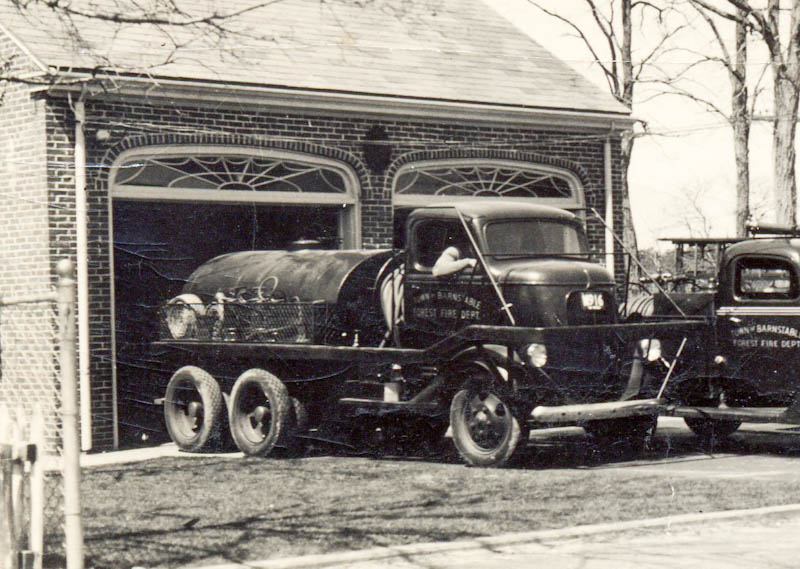
The
"First" of Cape Cod's Brush Breakers.
Built by the Town of Barnstable Forest Fire Department in 1937 on
a Ford Chassis.
It was built at Carl Starck's Garage on Main Street, Osterville.
Designed by T.O.B. Forest Warden and Centerville-Osterville Fire
District Chief Bernard .S. Ames
it had all wheel drive, an 800 gallon water tank, steel bars, and
a Leonard fire pump.
This unique apparatus was badly damaged by its first major fire,
in Hyannis on May 5, 1937,
even before it was officially in service. It was rebuilt and
served until 1952 at the
Osterville Fire Station.


Photo showing early trials or training with the new brush breaker in 1937.

A ROUGH START
The 1937 Ford
brush breaker was called to one of its first fires before it's
paint
had even dried.
This fire in the Ridgewood Avenue area of Hyannis
on May 5, 1937 burned
over 2000 acres into the Cummaquid area of town.
This newspaper
clipping
shows the raging fire as it destroyed the brand new brush
breaker.
The truck was rebuilt and served until 1952.

1937 Ford brush
breaker in Osterville.

1930 Forest Fire Truck from Edgartown, Martha's Vineyard

Plymouth forest fire truck c.1930s.
(Plymouth FD collection)
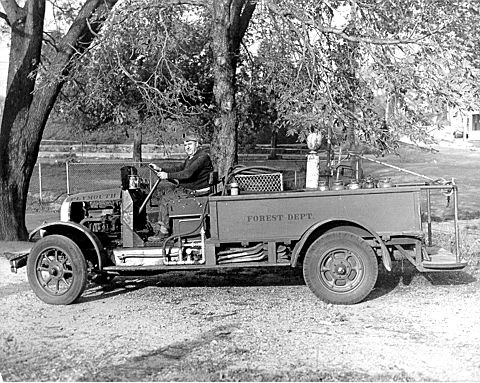
Plymouth forest fire truck c.1930s.
(Plymouth FD collection)
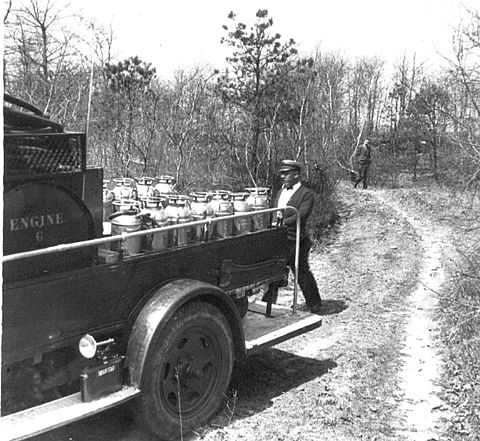
Plymouth Engine 6 with fire extinguishers c.1930s. .
(Plymouth FD collection)

This photo shows a Massachusetts Department of Conservation truck
c.1920s
drafting water from a bridge. This would have been one of the early forest fire
trucks
operated by the state to assist communities, some of which had little for fire
equipment at the time.

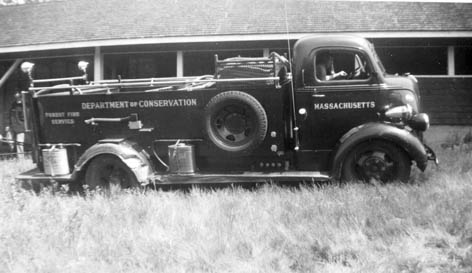
STATE FIRE TRUCKS
The Commonwealth of Massachusetts Forest Fire Services
operated a number
of these 1939 Ford 1-1/2 ton cab over fire trucks.
Each truck had a 400 gallon
water tank and a PTO pump, and carried about 2000' of hose.
The Sandwich
truck remained in service until 1966.
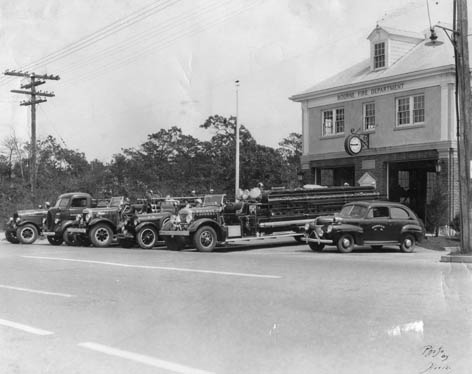
BOURNE FIRE STATION
Several of the State trucks were assigned to the Cape area.
One in Brewster
at the state forest, one in Sandwich, and one on the Vineyard. The
Sandwich
truck was later stationed at the Buzzards Bay Fire Station c.1941. (above).
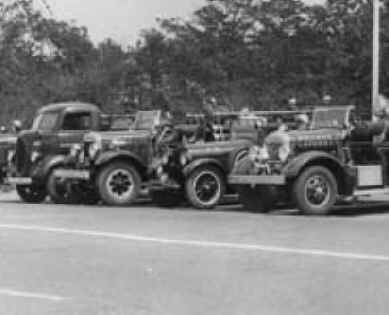
State fire truck can be seen on the left.
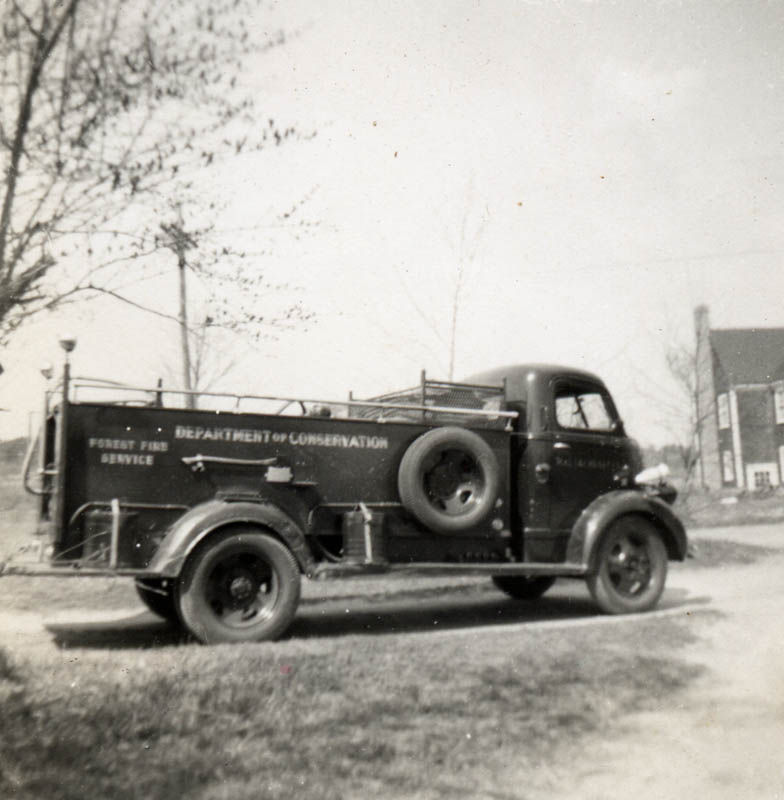
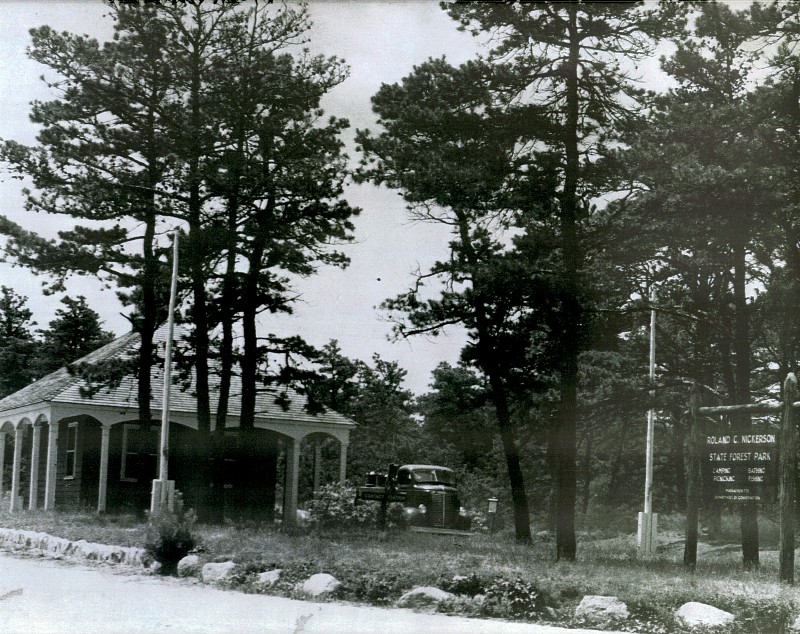
STATE FIRE TRUCK
One of the 1939 era Massachusetts Department of Conservation fire trucks
at the Roland C. Nickerson State Forest in Brewster.


1939 State Forest Fire Truck at Pocasset (Bourne) Fire Station.

One of the former State 1939 Ford 1-1/2 ton forest fire trucks.turned up in the
1990s
and it was hoped that the vehicle could be refurbished. It did not turn
out that way.
These photos taken at Shawme Crowell State Park.
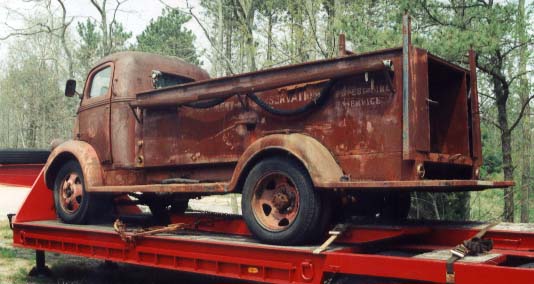
This 1939 Ford Forestry Truck was recently salvaged and
brought to
Shawme Crowell State Park to be refurbished.
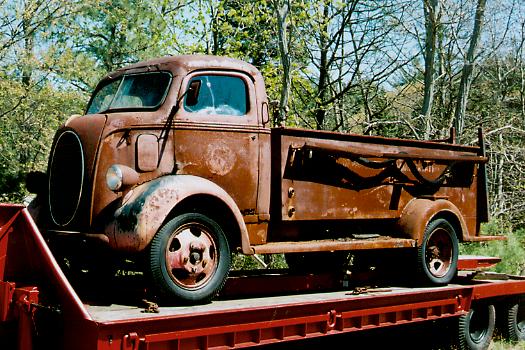
A number of these 1939 style Ford fire trucks apparently served
across the state.
| The
|
The
Second Generation County Brush Breaker C-15
The first county brush breaker (1939 Ford) was replaced by this 1957 Ford /
Maxim
Brush Breaker. It carried 800 gallons and had a 250 gpm pump.
No.1 (C-15) was
assigned to the North Falmouth Fire Station from 1957 until 1971
Plymouth Forestry 172 is a 1990 International / EJ Murphy 750 gallon brush breaker.
The Last
County Brush Breaker
West Barnstable got this brush breaker in 1982 to replace its
1958 County Breaker.
It has a 1967 International military chassis and bar work by Ted
Young.
This breaker with its 1000 gallon tank was the last of the County
breakers.
A bi-plane can
be seen against the plume of smoke at this Cape forest fire.
The plane may have been observing conditions from above.
Carver 1964.
May 23, 1964 - Saturday
A large fire burned in the South Carver area.
May 25, 1964 - Monday, Approx 1:00 PM
The fire tower observed a fire starting up in the
Farm-to-Market Road area in South Carver near where the fire burned
on the previous Saturday. Just three minutes later, another fire was
spotted in the Suther's Marsh Road area off Federal Furnace Road.
Eight breakers from Plymouth and Carver responded into the Suther's
Marsh Road fire. Other apparatus from Wareham responded into the
Myles Standish fire. The Suther's Marsh fire was controlled in two
hours, but the other fire continued to gain headway and was now much
larger. It moved eastward towards Charge Pond and Camp
Cachalot at Five Mile Pond and Little Long Pond. It jumped the
Agawam River and moved to White Island Pond. Chief Arthur Lamb
chose to take a stand at White Island Pond to block the north end of
the fire and at Shangri-La Shores near Glen Charlie Road to the
south. About 1,000 men battled the fire with winds gusting to 30 mph
and tinder dry conditions. About 20 cottages lost. About 5,500
acres burned.
Fire begins to jump Route 6, May 1, 1965. It continues to
burn towards Sandwich village.
May 1, 1965
75 degrees - wind Sw @35 mph
1254 Hours - Brush fire is reported near Forestdale Road & Pocasset Road in
Otis.
1301 hours - Bourne fire tower reports the fire is moving fast. Otis had 2
breakers responding.
1303 hrs - Bourne fire tower reports a lot of fire there.
1306 hrs - Bourne fire tower updating looks real bad. State Car 2 requests 7 or
8 breakers
and 4-5 tank trucks. Responding apparatus includes C-15, T-35, B-142, B-143,
T-148
C-14, B-250, B-254, B-130, B-128, and B-216.
1312 hrs - Cat 251 (Mashpee Chief) on location requests 8-10 more breakers
"Now!"
1312 hrs - P18 reports 40-50 acres burning and spreading fast.
1315 hrs - Fire now are Wood Road spreading very fast.
1315 hrs - Bourne fire tower requested additional trucks.
C-12, B64, B204, B217
1320 hrs - Request made to Plymouth County for 15 more breakers and
10 tank trucks, plus all equipment from State District 2
1325 hrs - Fire crossed Jefferson Road, headed for Gibbs Road. Plan to
make a stand
on Route 6. State police closed Route 6. Request for all available
pumpers
and tank trucks to Route 6 and Route 130. Also requested Plymouth County
pumpers to stage at the Sandwich / Bourne town line.
1330 hrs - Fire crossed Gibbs Road. "Doubt it can be stopped at Route 6"
1345 hrs - Fire is past Gibbs Road and heading for Mid Cape.
1420 hrs - Fire jumps Route 6 with many trucks on the road.
1440 hrs - Orders to send all pumps and tankers to Route 6A Sandwich village.
1530 hrs - Fire is finally stopped at Sandwich village.
2230 hrs - Apparatus is released from mutual aid.
Several thousand acres blackened by the fire.
Large forest
fires can be very destructive and dangerous. This photo taken
from the Fire Patrol Plane
during the "Pave Paws Fire" of April 22, 1988 shows the
flames reaching 60'-100' in the air and
the thick smoke produced by the fire.
The "Pave
Paws" military radar site in the northern part of the
Massachusetts Military Reservation (Otis)
is seen at the right in this photo. This fire burned intensely
towards this vital military installation.
The clearing around the facility prevented any damage. The fire
however, continued to burn past the
facility consuming over 2000 acres within a couple hours.
Chilmark Breaker 131
2008 Freightliner M2 4x4 / Bulldog Brush Breaker
300 gpm / 750 gallons / 20 Class A
![]()
![]()
CAPE COD BRUSH BREAKERS
![]()
Related Links
Massachusetts DCR - Bureau of Forest
Fire Control
Forest Fire Lookout Association
History Early Fire Towers
Massachusetts Fire Tower Locations
CCFD.com - Plymouth Brush Breaker Drill April 2006
CCFD.com - Plymouth-Wareham Brush Fires May 2006
CCFD.com
- Sandwich Fire Tower 2006
Robert Winston Article on the
Fire Season in Eastern &
Southeastern, Mass
Posted May 23, 2008
NOTE
Photos in this series are from various sources
including fire department and personal collections.
(Top)
PAGE 02
![]()
![]()
![]()
![]()
CAPE COD BRUSH BREAKERS
![]()
Related Links
Massachusetts DCR - Bureau of Forest
Fire Control
Forest Fire Lookout Association
History Early Fire Towers
Massachusetts Fire Tower Locations
CCFD.com - Plymouth Brush Breaker Drill April 2006
CCFD.com - Plymouth-Wareham Brush Fires May 2006
CCFD.com
- Sandwich Fire Tower 2006

NOTE
Photos in this series are from various sources
including fire department and personal collections.
(Top)